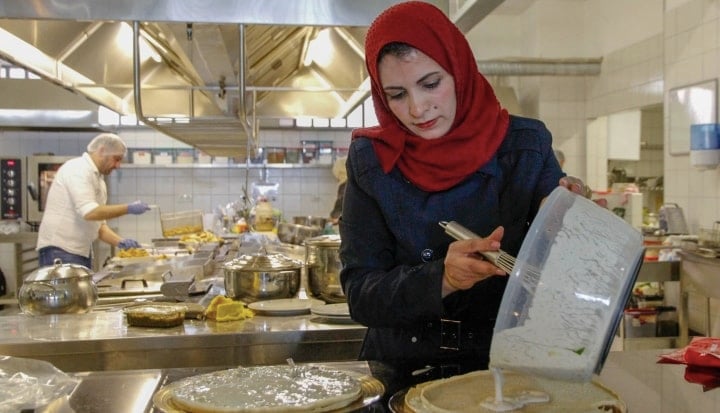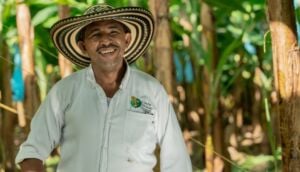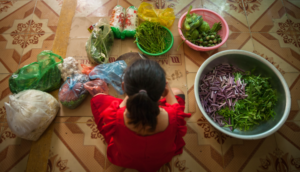The global refugee population is at the highest level on record and there is no sign of the crisis abating. The most common private sector response is donations to address immediate humanitarian needs. But, with the average displacement ranging from 10 to 26 years, support is also needed to build sustainable livelihoods for refugees, especially as they experience cultural and legal barriers to securing a job in a safe environment in their host countries.
While the Sustainable Development Goals drive some private sector interest in contributing to the refugee crisis response, companies do not always know what concrete steps to take. As members of the United States government funded “Livelihoods Innovation through Food Entrepreneurship (LIFE)” consortium, we have seen firsthand how supporting refugee food entrepreneurship is “one entrée” into promoting livelihoods for refugees. The food sector is attractive for refugee entrepreneurs because of its lower barrier to entry, its accessibility for women, and its opportunities for impact. We call on the private sector to join efforts to make these new businesses successful.
How the business community can provide support to refugee food entrepreneurs
General recommendations for how the private sector can assist refugees have been provided by the United Nations Higher Commission for Refugees, and in a report by the International Finance Corporation and The Bridgespan Group. Yet, guidance to the business community specifically on supporting refugee food entrepreneurship is lacking. What can the private sector do to engage?
- Support refugee entrepreneurship development programs in the food sector. With a new market and regulations to navigate, even the most experienced refugee entrepreneur can benefit from support with starting a business in their host country. American ice cream company, Ben & Jerry’s, provides such support. Ben & Jerry’s is partnering with The Entrepreneurial Refugee Network to offer entrepreneurship training and mentorship, as well as part-time employment, to refugees through Ben & Jerry’s Ice Academy. In addition to programs, private sector partners can provide mentorship, pro bono legal advice, and financial assistance. Offering such support is also way to engage employees in service.
- Source from refugee food entrepreneurs for catered events and meals. Maide Mutfak, an Istanbul-based catering business supported by the BBVA Momentum social entrepreneurship program, employs disadvantaged women (including refugees) and also provides them with culinary and entrepreneurship training. Companies can support such enterprises by selecting them to cater their events. Eat Offbeat, for example, is a New York social enterprise that offers refugee-cooked meals to corporate clients like Estée Lauder, Google, and KickStarter. Food can promote awareness among employees, as well as encourage social integration of refugees.
- Build partnerships with local NGOs serving refugee food entrepreneurs. Food is a bridge for uniting stakeholders across sectors and interest groups, making projects in the food sector ripe for cross-sector collaboration. Engage with what local NGOs are doing and seek opportunities for participating in open-door events. At its Food Enterprise Centers in Turkey, the LIFE Project offers events such as Demo Days and community meals attended by the project’s members, government officials, and food sector representatives.
- Provide financial support to programs with finite donor funding. Companies can support revenue-generating development projects with donor funding coming to an end. These could be projects with feasible business models that are not yet fully self-sustaining. Examples include food incubators that charge membership fees for kitchen usage or entrepreneurship incubation programs that can lead to investment opportunities.
- Identify new food products to bring to scale. LIFE Project member Meyas Saati is introducing makdous (stuffed and pickled eggplant, a regional dish from Homs, Syria) to the market in Mersin, Turkey. Taking advantage of the growing interest in ethnic food products, private sector entities can source food products from refugees like Meyas and introduce them to new markets. For example, a frozen food company could partner with a home kitchen entrepreneur like Meyas, work with them to adjust recipes for large-scale production, and package the dish for distribution across Turkey. They would have a unique product with a compelling story — maybe the basis for an entirely new product line!
With the support of the private sector, food entrepreneurship as a source of livelihoods will grow. By starting food businesses, refugees can better integrate into a new society and be viewed in a more positive way. The growing field of gastrodiplomacy has emerged as a powerful tool for social integration. Food becomes not only a source of income for refugees, but also a way to promote the tastes and flavors of their culture into a new homeland. Their successful social and economic integration leads to richer, more stable communities – and that benefits us all.
Do you have other ideas on how the private sector can engage refugee food entrepreneurs? Post a comment below!










